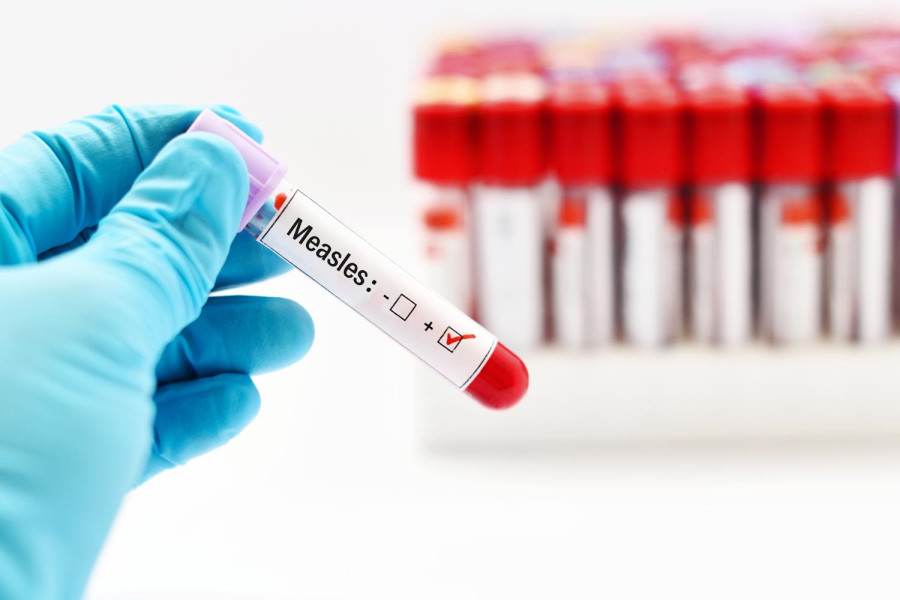Health
Nepal to request GAVI for measles, human papillomavirus vaccines
Health ministry plans to initiate a nationwide drive against the measles virus.
Arjun Poudel
The Ministry of Health and Population plans to request the Global Alliance for Vaccine and Immunisation (GAVI) for measles and human papillomavirus vaccines.
Officials said that they are planning to start a nationwide drive against measles and rubella viruses and include human papillomavirus vaccine in their routine immunisation programme, next year.
“Yes, we are preparing to request GAVI for both vaccines,” said Dr Bibek Kumar Lal, director of the Family Welfare Division, under the Department of Health Services. “We will submit the proposal by July 18, which is the deadline.”
Nepal has witnessed a massive measles outbreak since the start of 2023. One person died and 17 districts including Kathmandu reported measles outbreaks.
Health authorities began additional vaccination drives in the affected areas, using the doses supplied by GAVI.
The health ministry has been planning a nationwide drive against the virus next year as many districts across the country witnessed outbreaks, which increased the risk of further spread of the virus. The ministry also initiates a nationwide drive against measles and rubella every four years targeting children, who may have missed the measles vaccine. Even if the government purchases measles vaccines for routine immunisation, it seeks the help of the GAVI for measles vaccination.
Under the nationwide campaign, children under 15 years will be administered the measles-rubella vaccine.
“GAVI may not provide vaccines for all children under 15 years across the country,” said Lal. “We have planned to administer vaccines to those under 15 from the districts which have recorded measles outbreaks recently.”
Measles is a highly contagious viral disease transmitted through fluids from the nose, mouth or throat of an infected person. It can be potentially deadly for unvaccinated people.
Nepal had committed to eliminating measles by 2023 after missing the earlier deadline of 2019. However, massive outbreaks of the virus in several districts from the east to west and in the Kathmandu Valley from which over 1,000 children were infected shows that the country is nowhere close to eliminating the disease. The government has extended the eradication deadline to 2026.
To declare measles as eliminated, the number of cases should be less than five per million people yearly.
A recent report of the Nepal Demographic and Health Survey-2022 carried out by the Ministry of Health and Population shows that four percent of children in the 12 months to 23 months age group have received no vaccination.
This figure was just one percent in 2016, and the rapid surge in the number of unvaccinated children poses a serious threat to the country’s achievements in immunisation made over the years through huge investments, warn the child health experts.
The Ministry of Health and Population started a nationwide door-to-door campaign to “search and inoculate” children who missed out on the routine immunisation programme carried out in May and June.
Officials say more than 2,000 children across the country, who had not taken even a single dose of the vaccine, were inoculated. Thousands of other children, who did not complete all doses of routine vaccines, were also inoculated.
The health ministry has also planned to include human papillomavirus vaccine in the routine immunisation programme. Human papillomavirus is a viral infection that spreads through skin contact. The virus causes cervical cancer, which is the second-most common cancer in the developing world and a major cause of death among Nepali women. It is estimated that hundreds of women get diagnosed with cervical cancer every year in Nepal.
According to the BP Koirala Memorial Cancer Hospital in Bharatpur, more than 700 women suffering from cervical cancer seek treatment at the hospital every year.
Experts say early treatment prevents up to 80 percent of cervical cancer.
Nepal has purchased 20,000 doses of HPV (Human papillomavirus) vaccine, which will be administered to girls aged between 11 and 14 years in seven sparsely populated districts.
“We have been planning to start a nationwide drive of HPV vaccination, in which we will administer the vaccine to all eligible girls under 14 years of age,” said Lal. “Then we will administer vaccines in the schools every year in which we plan to inoculate girls of 10 years, if we get vaccines from the GAVI.”
The World Health Organisation says HPV vaccination is recommended as part of a coordinated and comprehensive strategy to prevent cervical cancer and other diseases caused by the HPV.
HPV vaccination was also mentioned in the government’s policies and programmes for the fiscal year 2021-2022, but the budget was not allocated accordingly.
Doctors say most cervical cancers are associated with the HPV, a sexually transmitted infection. Widespread immunisation with the HPV vaccine could reduce the impact of cervical cancer and other cancers caused by the HPV worldwide.
Bhutan, Sri Lanka, Thailand and the Maldives have introduced HPV vaccines nationally, while India and Indonesia have introduced them in some districts.
Nepal, in 2016, piloted HPV vaccine in Chitwan and Kaski districts. All girls aged between 11 and 13 years were given two doses of the HPV vaccine during the pilot programme.
The health ministry had also sought help from the World Health Organisation during a visit of its director general Dr Tedros Adhanom Ghebreyesus, in April, to introduce the HPV vaccine into the regular immunisation list.
It is estimated that hundreds of women are diagnosed with cervical cancer every year in Nepal.




 9.7°C Kathmandu
9.7°C Kathmandu















